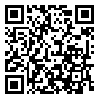Volume 10, Issue 44 (4-2022)
erj 2022, __(44): 1-15 |
Back to browse issues page
Download citation:
BibTeX | RIS | EndNote | Medlars | ProCite | Reference Manager | RefWorks
Send citation to:



BibTeX | RIS | EndNote | Medlars | ProCite | Reference Manager | RefWorks
Send citation to:
nowrezi R A, hidari M H, sapahi M. The transcendence of rational experiences based on Plotinus' aesthetic view. erj 2022; 10 (44) : 1
URL: http://erj.khu.ac.ir/article-1-1076-en.html
URL: http://erj.khu.ac.ir/article-1-1076-en.html
1- University Isfahan , r.noroui@edu.ui.ac.ir
2- University Isfahan
2- University Isfahan
Abstract: (8597 Views)
The purpose of this study was to explain and analyze the methods of aesthetic education from Plotinus' point of view based on the perception of beauty to enhance the intellectual experiences of learners. Inferential analytical research method using Frankenna's model. The results of the research showed that the soul, as a person, recognizes beauty as experiences of self-knowledge, art, love and knowledge, and by gaining aesthetic experiences, provides the ground for its excellence and influence on others. Aesthetic experience has a motivating role in intellectual activities and the elements of aesthetics can turn intellectual activity into an aesthetic experience and make it transcendent. The experience of aesthetics as a basic competency is not limited to a specific field and activity and has implications for the goals, content and teaching and learning methods at the level of educators and educators and the curriculum. The ultimate goal of Plotinus' aesthetic education is to unite with the origin of beauty and to achieve reasonable beauties. Aesthetic training methods include self-discovery, visual observation, imagination and self-deployment, and inner insight. These practices are appropriate and corresponding to the components of transcendental intellectual experiences, including; originality, intuition, inner mobility, dynamism and interaction, enthusiasm and passion.
Article number: 1
Type of Study: Research Paper |
Subject:
Educational Philosophy
Received: 2021/11/13 | Revised: 2023/11/21 | Accepted: 2022/05/11 | ePublished: 2022/05/13
Received: 2021/11/13 | Revised: 2023/11/21 | Accepted: 2022/05/11 | ePublished: 2022/05/13
Send email to the article author
| Rights and permissions | |
 |
This work is licensed under a Creative Commons Attribution-NonCommercial 4.0 International License. |





